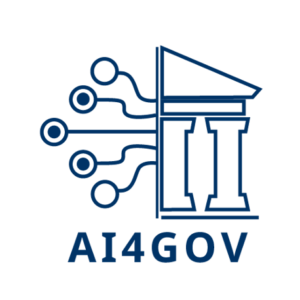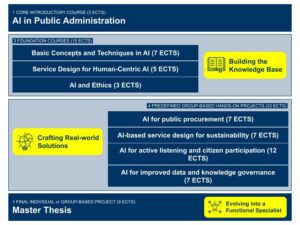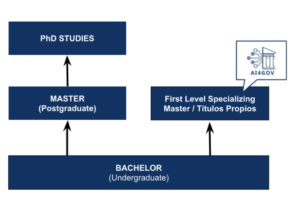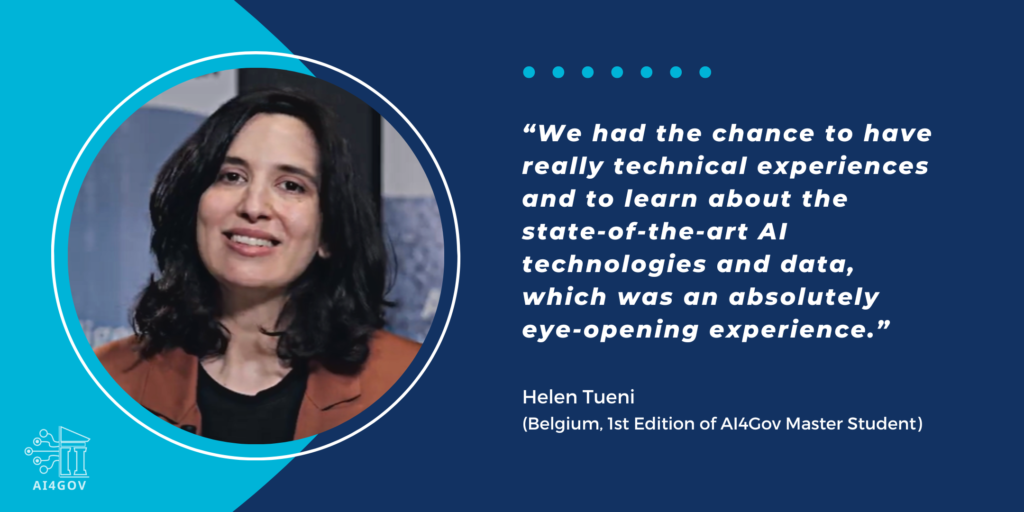 The path to becoming a Future Functional Specialists in AI
The path to becoming a Future Functional Specialists in AI
By engaging yourself in this all-round Master’s program that includes not only thorough theoretical learning but also active hands-on group projects, you will become a functional specialist who is capable of analyzing, designing, implementing and managing AI-related assignments in public services.
Testimonials
This Master will take our students through a great journey to discover strengths and weaknesses of using AI for public services.
Marzia Mortati, Vice-Director Of AI4Gov
Objectives
Understand the potential of data
Know and understand the potential of data to create public services, and be able to critically assess social and ethical impacts:
- Understand datasets (quality, appropriateness, value, cost, etc.)
- Learn how to operate with data and to manipulate data to extract insights for design
Understand what AI can do
Understand what AI can currently do, what the different applicative domains are with a specific focus on governance with AI, and what features it can have:
- Understand the state-of-the-art of AI and the available market solutions with a level deep enough to commission implementation.
Propose practical AI projects
Analyse, design, plan, implement and evaluate human-centric AI projects for an up-to-date range of public services:
- Develop strategic management abilities for AI-based projects
- Learn how to apply a human-centric approach to the design of AI-based services
Be able to commission/buy AI based systems
Be able to commission/buy AI-based systems to companies and experts, and evaluate and analyze their performance and quality:
- Learn how to manage innovative procurement and public-private partnership in public services design and delivery.
- Learn how to evaluate the quality of the commissioned implementations.
Make informed judgements on AI
Get the ability to think critically and analyze different use cases for AI delivery through public services in society:
- Ability to create public value through innovative design and implement AI-based projects
Acquire project group work and communication skills
Understand the potential of acquiring project groupwork and communication skills.
- Develop the ability to present and discuss ideas and an attitude to negotiate in teamwork.
Curriculum
Overview
Master in Artificial Intelligence for Public Services

- Title: International Master in AI for public service
- Level: Master of 1st level
- Teaching language: English
- Duration: 10 months – September, June
- Place of Delivery: mainly online
- For the 2024-2025 academic year, we will select up to 30 students. This change is due to the program transitioning from European co-funding to independent management.
Number of CFU of the Master: 60 (1 ECTS credit is equivalent to 25 hours of student dedication) - Website: https://ai4gov-hub.eu/
- Universities delivering the Master: Universidad Politécnica de Madrid, Politecnico di Milano
Master Structure
Please note that the modules presented are provisional and maybe slightly altered for course edition 2024-2025

Curriculum
Please note that the modules presented are provisional and maybe slightly altered for course edition 2024-2025
To earn a Master in Artificial Intelligence for Public Services, you must successfully complete 4 courses, 4 project-based group activities and a Master thesis (60 ECTS total), including:
1 core introductory course (3 ECTS total):
AI in Public Administration (2 weeks)
3 foundation courses (15 ECTS total):
Basic Concepts and Techniques in AI (7 ECTS, 4 weeks).
Service Design for Human-Centric AI (5 ECTS, 4 weeks).
AI and Ethics (3 ECTS, 2 weeks).
4 predefined group-based hands-on projects (from 7 to 12 ECTS each).
A large part of the programme is based on the idea of having you as students working in multidisciplinary-multicultural groups towards the design of public services that use different types of AI techniques. We have selected 4 predefined topics and AI and service-design focus areas for each of them, so that students will get a comprehensive insight of types of problems that can be addressed with AI solutions and types of approaches that may be taken to design services for them. These group-based projects will be structured around 4-6 weeks of work, where each group will have a mentor assigned, who will drive the group towards the achievement of the solutions, The following work will be done each week, with checkpoints on every common session:
Timeline:
| Phase 1
(Week 1) |
Setting the objectives, understanding/framing the problem, understanding user/ context /technology (i.e., data available, barriers, limits, feasibility of applying AI, user needs, organisation needs, …) |
| Phase 2
(Weeks 2-3) |
Extract insights from the research, reframe the problem, define design opportunities; go in depth into some of the AI techniques that can be used; idea generation |
| Phase 3
(Weeks 3-4-5) |
Initial idea iteration/prototyping, basic design of the solution, ethics consideration. |
| Phase 4
(Weeks 4-5-6) |
Refinement, basic implementation, implications in procurement of solutions, final presentations. |
AI for public procurement (7 ECTS, 3 weeks).
AI-based service design for sustainability (7 ECTS, 4 weeks).
AI for active listening and citizen participation (12 ECTS, 8 weeks).
AI for improved data and knowledge governance (3 weeks).
1 final individual or group-based hands-on project, which will lead into your Master thesis (9 ECTS, 3.5 weeks)
This last project will allow students to propose and work, individually or in groups, on a use case that they would be interested in, based on their real experiences and needs. The final delivery will be the Master thesis. There will also be a final event where we will hold the graduation ceremony.




